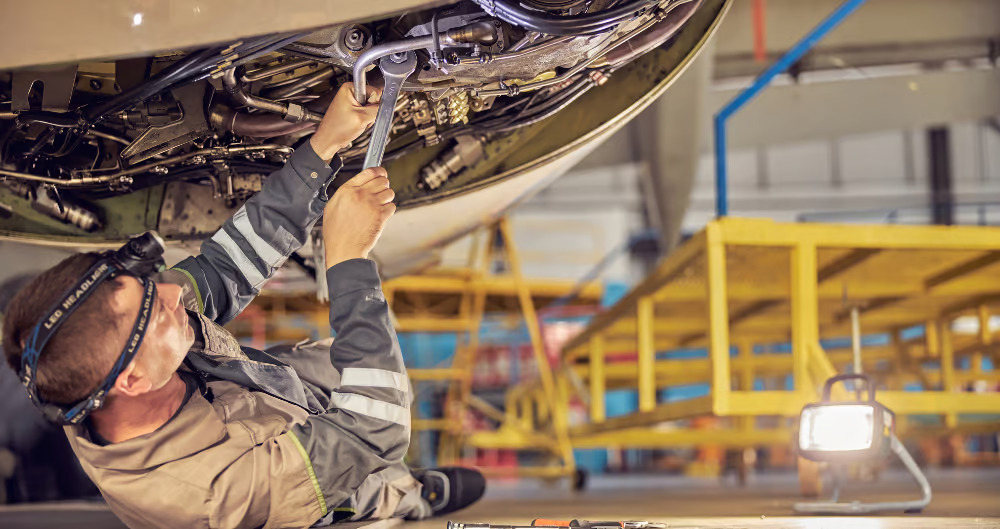Bachelor's Degree in Aviation Maintenance: A Complete Guide (2024)

Learn what’s involved in earning a Bachelor's degree in Aviation Maintenance. We'll cover what the degree is, its pros and cons, the steps to get it, how long it takes, online options, what you’ll study, and potential career paths.
Key Points
- A bachelor's degree in Aviation Maintenance provides comprehensive training in aircraft maintenance, repair, and inspection.
- Pursuing this degree offers both advantages and disadvantages that should be carefully considered.
- The admission process, financial aid options, and program completion timeline are crucial factors to understand.
- Graduates can explore diverse career paths, including entry-level aviation maintenance roles, graduate school opportunities, and various industry-specific jobs.
- The average annual salary and job outlook for aviation maintenance professionals are favorable, making this degree a valuable investment.
How Long Does it Take to Get a Bachelor's Degree in Aviation Maintenance?
The duration of a Bachelor's Degree in Aviation Maintenance program is typically four years, or eight semesters, of full-time study. However, the exact length may vary depending on factors such as the institution, the student's course load, and any prior college credits or relevant experience.
What to Expect from a Bachelor's Degree in Aviation Maintenance
A Bachelor's Degree in Aviation Maintenance program provides students with a comprehensive education in the field of aircraft maintenance and repair. Coursework typically covers topics such as:
- Aircraft structures and materials
- Avionics and electrical systems
- Powerplants and propulsion systems
- Aircraft systems and components
- Maintenance procedures and regulations
- Inspection techniques and documentation
- Safety and quality assurance
- Project management and troubleshooting
In addition to classroom instruction, students can expect to gain hands-on experience through laboratory work, simulation exercises, and internships or cooperative education programs. These practical components help students develop the skills and expertise necessary to work on a wide range of aircraft and aviation systems.
What Can You Do with a Bachelor's Degree in Aviation Maintenance?
Graduates of a Bachelor's Degree in Aviation Maintenance program have a variety of career opportunities available to them:
Graduate School Preparation
With a Bachelor's Degree in Aviation Maintenance, students can pursue further education, such as a Master's Degree in Aviation Maintenance or a Doctoral Degree in Aviation Maintenance. These advanced degrees can provide specialized knowledge and skills, opening up opportunities for research, teaching, or leadership roles in the aviation industry.
Entry-Level Aviation Maintenance Roles
Graduates can find employment as entry-level aviation maintenance technicians, mechanics, or inspectors. They may work for airlines, aircraft manufacturers, repair stations, or government agencies, ensuring the safe and efficient operation of aircraft.
Career Opportunities
Beyond entry-level positions, graduates with a Bachelor's Degree in Aviation Maintenance can explore a wide range of career opportunities, including:
- Aircraft maintenance supervisor or manager
- Avionics technician
- Structural repair technician
- Powerplant specialist
- Quality assurance inspector
- Technical writer or instructor
- Aviation safety specialist
- Maintenance program coordinator
According to the Bureau of Labor Statistics (BLS), the average annual salary for aircraft mechanics and service technicians, a category that includes graduates of a Bachelor's Degree in Aviation Maintenance, was $75,020 in 2023. The job outlook for this occupation is projected to grow by 4% from 2022 to 2032, which is about as fast as the average for all occupations.
Final Thoughts
A Bachelor's Degree in Aviation Maintenance is a valuable investment for individuals interested in a career in the aviation industry. This comprehensive program provides students with the knowledge, skills, and hands-on experience necessary to become skilled aviation maintenance professionals. By understanding the admission requirements, financial aid options, and career prospects, aspiring students can make an informed decision about pursuing a Bachelor's of Science in Aviation Maintenance.
Should this guide not quite meet your expectations, have a look at the other guides below to uncover one that suits you better:
- Bachelor's Degree in Accounting: A Complete Guide (2024)
- Bachelor's Degree in Criminal Justice: A Complete Guide (2024)
- Bachelor's Degree in Environmental Management: A Complete Guide (2024)
- Bachelor's Degree in Information Technology: A Complete Guide (2024)
- Bachelor's Degree in Paralegal: A Complete Guide (2024)

Athena is Co-founder and CEO of Dreambound.




